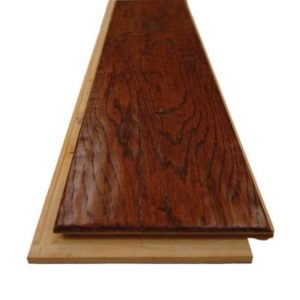 WASHINGTON—A unanimous affirmative determination was made by the International Trade Commission (ITC) on Dec. 3 to move forward with an investigation of claims that U.S. manufacturers of multilayered wood flooring are suffering material injury due to Chinese manufacturers selling similar products at dumped prices with unfair subsidies from the Chinese government (FCNews, Nov. 8/15). It is also alleged that manipulation of its currency gives the nation an unfair advantage.
WASHINGTON—A unanimous affirmative determination was made by the International Trade Commission (ITC) on Dec. 3 to move forward with an investigation of claims that U.S. manufacturers of multilayered wood flooring are suffering material injury due to Chinese manufacturers selling similar products at dumped prices with unfair subsidies from the Chinese government (FCNews, Nov. 8/15). It is also alleged that manipulation of its currency gives the nation an unfair advantage.
Jeffrey Levin, counsel for the Coalition for American Hardwood Parity (CAHP), said the facts of the case were “that the volume of subject imports is significant, that subject imports have had and continue to have a pronounced adverse impact on U.S. prices of the product and that the injuries suffered by this industry is to a significant degree attributable to the tide of cheaply priced, directly competitive and, we submit, dumped and subsidized imports from China.”
Executives from Shaw and Mannington gave testimony on behalf of CAHP at an initiation hearing in November.
As a result of the ITC vote, an investigation will be conducted by the U.S. Department of Commerce (DOC) into the pricing practices of manufacturers and exporters of product from China, as well as subsidies provided to those companies. The investigation could result in duty escrow requirements in 2011, in addition to added compensation for each company’s level of purported unfair trading.
Peter Spirer, consultant and floor covering industry veteran, has attributed lower pricing of Chinese goods to being better producers. “For the last decade they have spent hundreds of millions of dollars upgrading their plants and equipment with high speed, superior machinery.” He added that sourcing wood from North and South America, Northern Europe, Africa and other regions of Asia is a forgotten cost of business, in addition to the freight necessary to send finished product to other markets. “Ocean freight is an expensive ingredient of cost, at least enough to offset lower labor costs.”
He credits a host of performance issues like cupping, crowning and seam separation as characteristics of strip products that have made American consumers wary of solid wood flooring.
“The merits of appearance, performance, environmental friendliness and price have won the day,” Spirer told FCNews. “The simple truth is the Chinese are better at it than we are, they have achieved low-cost producer status based on investment in machinery and equipment, and they have introduced innovative, dimensionally stable products at affordable prices.”
As the case propels, wood suppliers are keeping a close eye on the developments. “The U.S. government will identify a small number of Chinese exporters to investigate as mandatory respondents, and the weighted average of their results will set the standard duty rate,” said Jonathan Train, product manager, Swiff-Train. “Based on the information they provide and the standard cost the U.S. government calculates, that will establish the dumping rates. Some companies will have high rates and not be competitive and some will have low rates and remain competitive.”
Until a decision about the validity of the claims is reached, the course of investigation has varying effects on importers of Chinese goods. It has already changed at Swiff-Train. “As an importer, you have no idea where your factory’s rate will end up, so we have already stopped developing new products and will have to keep our inventory levels much tighter,” Train said. “Once a rate is established we can decide how to proceed.”
However, that is not the case for all suppliers of Chinese-manufactured product. For Pinnacle Interior Elements, Phillip Cutts, president, said, “We won’t be changing the way we do business.”
Not all importers of wood products have been affected by the investigation as the DOC determined bamboo and cork was not included in the multilayered wood classification. “We were involved from the beginning trying to figure out the impact; we’re comfortable with it at this stage,” said David Knight, president of bamboo supplier Teragren. “We want to support the wood industry as a whole. It’s all about a level playing field.”
A decision is expected to be reached by the end of the first quarter of 2011.
-Emily Hooper
